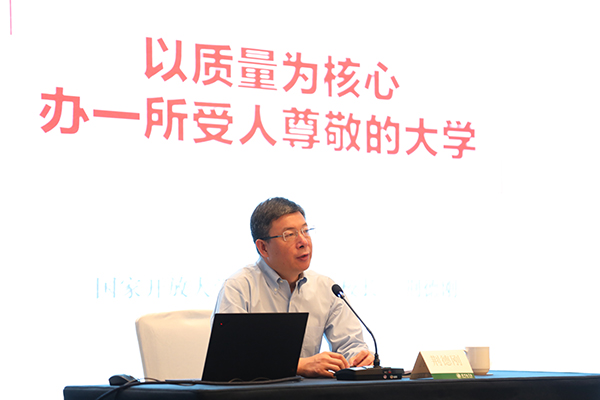 From 28-29 November 2019, the Quality Management Work Conference of the Open University of China (OUC) was held in Shenzhen.
From 28-29 November 2019, the Quality Management Work Conference of the Open University of China (OUC) was held in Shenzhen.
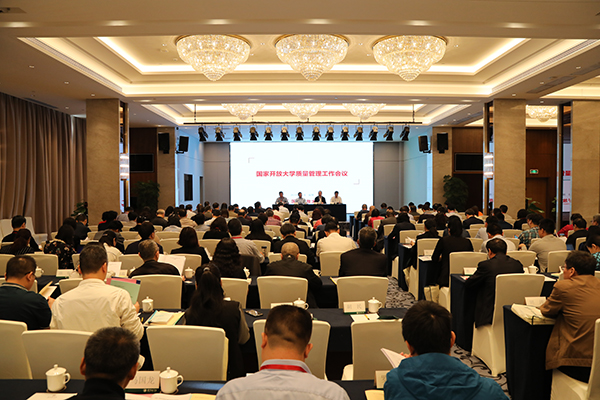
The conference focused on implementing the spirit of the 4th Plenary Session of the 19th CPC Central Committee, advancing the OUC's strategy of "creating excellence and improving quality", systematically summarising quality management work experience, and developing new models and ideas for quality monitoring, evaluation, and supervision. Jing Degang, Party secretary and president of the OUC, attended the conference and gave a keynote speech entitled Running a Respectable University with Quality as the Core. More than 140 people in charge of the quality of teaching and management from the OUC headquarters, 45 branches, and 14 directly-affiliated schools attended the conference. The conference was presided over by OUC vice president Lin Yu.

Jing Degang pointed out that the 4th Plenary Session of the 19th CPC Central Committee put forward new requirements for education, which has provided a guideline and set a direction for successfully running open education. Combining these guidelines and directions with the reality of the OUC, it is proposed that by 2049, the OUC can be made into a world-class open university through a “three step" plan, striving to build a unique, high-level, and fenceless university, and creating a national centre of "Internet + education" and a special zone for the lifelong learning education system. We must seize the opportunity, pay close attention to quality with a spirit of dedication, hard work, and selflessness, adjust the structure, create excellence and improve quality, and push the cause of open education to new heights.
He emphasised that achieving the OUC's development goals requires the joint efforts of the entire school system. The first goal is to fully implement the spirit of the Fourth Plenary Session of the 19th CPC Central Committee. The second is to promote quality construction through the construction of the credit bank. The third is to promote quality through informatisation and build "One Road, One Network, One Platform" (5G Information Superhighway, OUC Learning Network, and Online Management Service Platform). The fourth is to promote quality through the reform of the "three teaching elements" (teachers, teaching materials, and teaching methodology). The fifth is to improve the three elements of quality (meticulous, enthusiastic, hard working), refinement (prophetic, foresighted, pioneering), and precision (scientific sampling, data-based analysis).
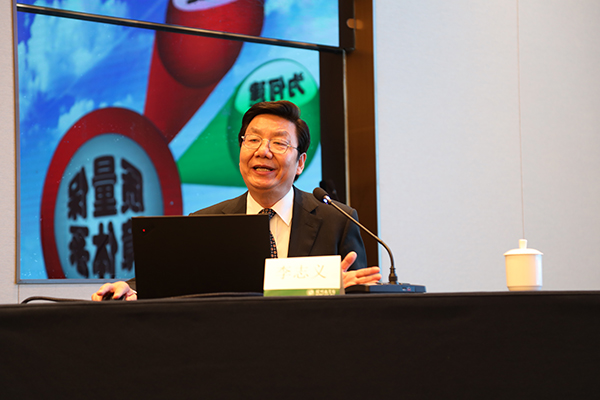
The conference also invited Li Zhiyi, a national education supervisor and expert from the Higher Education Evaluation Centre of the Ministry of Education (MOE), to give a guidance report entitled Concepts and Methods for Constructing Internal Quality Assurance Systems in Colleges and Universities on the ideas and implementation path of building a quality assurance system. The report focuses on what a quality assurance system is, and elaborates on the internal and external relations of quality assurance. It provides basis and guidance for building a complete and effective OUC quality assurance system.
Han Yi, director of the Quality Supervision and Evaluation Centre of the OUC, delivered a work report entitled Regulating Schools, Enhancing Quality, and Doing a Good Job in Safeguarding the Brand Reputation of the OUC with a Spirit of Dedication, Hard Work, and Selflessness. She summarised the progress and achievements of the previous work and put forward ideas for the follow-up work. This work has included unifying the quality concept and establishing new quality standards for the OUC; implementing the construction of the quality monitoring and evaluation system under the premise of "one road, one network, one platform"; setting up and launching a five-year interval evaluation system for branch schools; carrying out comprehensive annual teaching inspection; creating a graduate satisfaction survey covering all graduates from the class of 2020; improving the team's "Internet+" ability and quality management level; and establishing a collaborative scientific research and innovation mechanism.
The conference also arranged an experience sharing session between the OUC branches. Zhao Liling, president of the Xi'an Branch, shared the branch’s experience of promoting the sustainable and healthy development of teaching quality through the establishment of a big data platform for smart learning quality monitoring. Liu Chunlong, vice president of the Sichuan Branch, used the Sichuan Branch's four-level school quality management community as an example to share their experience of using system linkages to improve quality. Li Zhengguang, director of the Academic Affairs Department of the Fujian Branch, introduced their measures for strengthening the construction of the quality assurance system by making quality reports the focus. Li Yi, director of the Teaching Quality Supervision and Evaluation Centre of the Zhejiang Branch, summarised their experience in creating a graduate and employer satisfaction survey from the perspective of background significance, job deployment, and data mining.
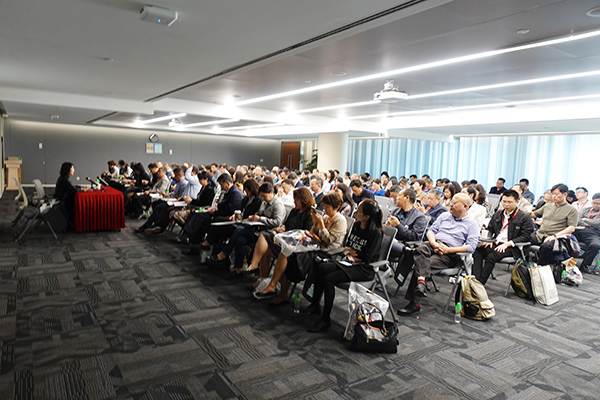
In order to broaden the university’s horizons, promote the integration of education and modern information technology, and successfully run a new type of "Internet+" university, the conference also arranged for the participants to visit the Shenzhen headquarters of Tencent Group. There, they learned about Tencent's advanced ideas, their smart social and content ecology, and their other "Internet+" services, and experienced the corporate culture of an advanced Internet company.
Afterwards, the participants held in-depth exchanges and discussions on issues such as improving the quality of school running, constructing a quality monitoring and evaluation system, and conducting pilot evaluations at branches. They commented that the theme of the conference is clear, the arrangement is unique, and the design is novel. They also felt that the OUC headquarters' determination to enhance quality and strengthen connotation is admirable. The quality improvement strategy was very popular with the participants. Jing Degang's report was inspiring, down-to-earth, and presents strong evidential facts. The participants stated that they must set up an education quality concept that is compatible with both the OUC's positioning and the needs of society, and improve the quality management level with "Internet+" thinking.
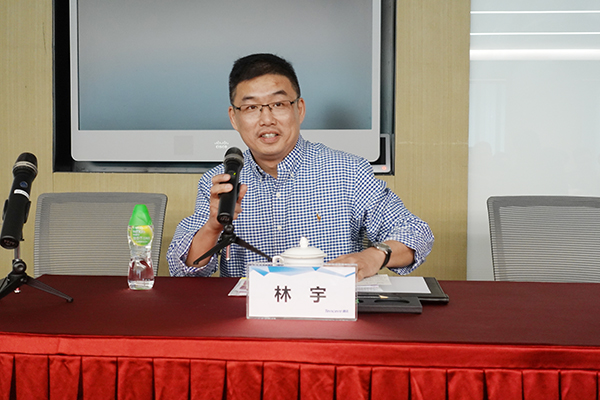
Lin Yu summarised the conference from five aspects. First, it reaffirmed the OUC's attitude i.e. that it is unswervingly focusing on quality. Second, it clarified the OUC’s mission: to formulate a three-year action plan to improve quality year on year. Third, it broadened the OUC's horizons by arranging for top-level higher education evaluation experts to give reports, enabling the participants to gain a new systematic understanding of the concepts and logic of quality and evaluation. In addition, the conference also arranged for the participants to visit the world's top Internet company Tencent, which is of great significance for the OUC to build a first-class "Internet+" university in terms of management and operation. Fourth, the participants exchanged experiences and strengthened communication and cooperation with the various branches. Fifth, the conference strengthened the OUC’s confidence. This was the unanimous consensus of the participants of the conference.
Lin Yu put forward four requirements for the follow-up work: First, comprehensively grasp the norms. Second, improve the quality standard system, including professional standards, curriculum standards, and resource standards. Third, build a quality guarantee system and establish a five-year interval evaluation system. All the branches must raise awareness and address the relationship between internal and external evaluation. Fourth, promote the transformation and development of "Internet+" universities and apply the most advanced new technologies with the support of information technology.
By He Dandan, OUC